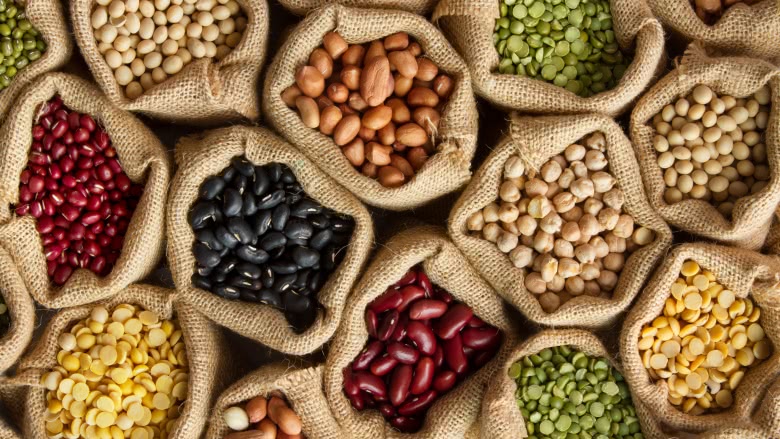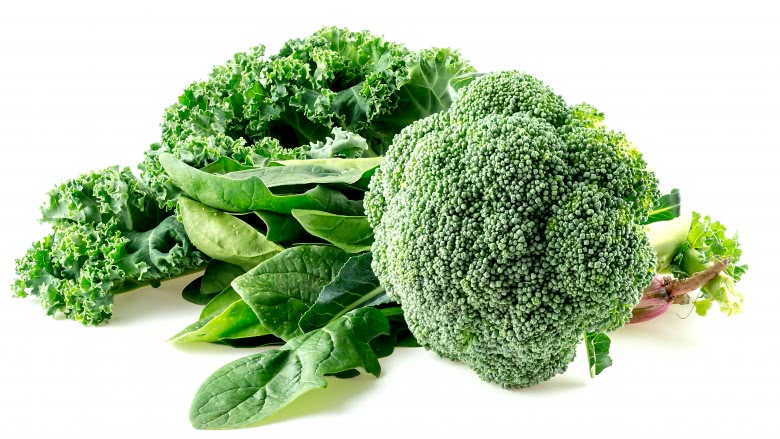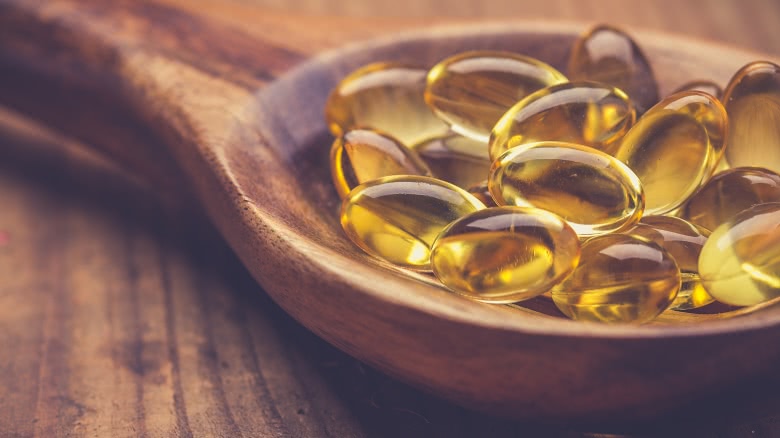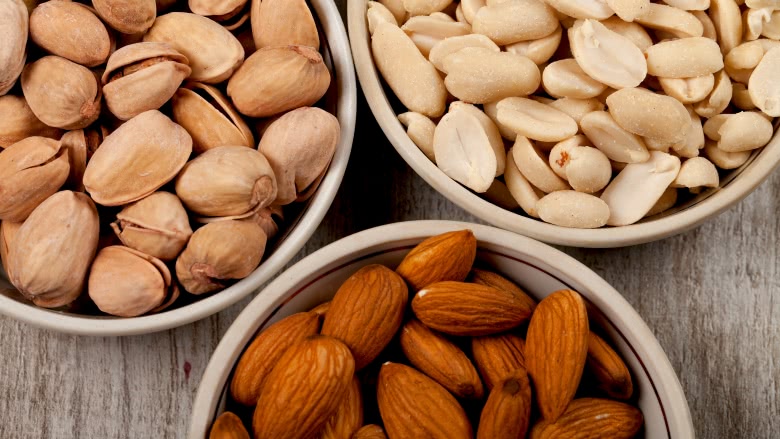Anti-Inflammatory Foods We All Need To Be Eating
When your body is hurt, it rushes white blood cells to the scene to help fight against "invading microbes or to heal damaged tissue." As this happens, the area begins to swell and a state of inflammation occurs, sometimes causing pain if there is pressure on surrounding nerves.
That being said, inflammation may also occur when there is no injury at all, which is the case for the 50 million Americans currently suffering from arthritis. Although there is no simple cure for this type of chronic pain, studies have found that combatting inflammation is actually possible through diet with a little help from these powerful anti-inflammatory foods.
Olive oil
In addition to being a great source of monounsaturated fats (a healthy fat that can help improve heart health) and antioxidants, olive oil also delivers quite the punch in the anti-inflammatory department. As the Arthritis Foundation explains, that's because olive oil is high in oleocanthal, "a compound that can lower inflammation and pain."
The foundation recommends adding two or three tablespoons of extra virgin olive oil (it's the least processed and therefore "retains more nutrients than standard varieties") to your daily diet, either as a salad dressing or as a simple cooking ingredient.
Spices
Taking to his blog to write about the best anti-inflammatory foods and spices, Dr. Mercola cites a 2012 study, which examined the various effects spices have on inflammation. Over the course of one week, 13 groups of 12 people were each assigned a particular spice and 10 of the 12 participants added it to their diet while the other two did not.
Blood samples were taken before and after meals on each day and, as Dr. Mercola explains, these were then "analyzed for antioxidant capacity. The researchers also analyzed how well the blood could dampen an induced inflammatory response in white blood cells." What they found was that four spices, when consumed in small amounts (just one teaspoon a day) were "significantly effective at quelling the inflammatory response". These top honors went to: cloves, ginger, rosemary and turmeric.
Green tea
While working on a research paper titled Natural Anti-Inflammatory Agents for Pain Relief in 2010, researchers from the Department of Neurosurgery at the University of Pittsburgh Medical Center concluded that green tea, which has "long been recognized to have cardiovascular and cancer preventative characteristics due to its antioxidant properties," can also be used to treat inflammation with great results.
According to their study, "green tea research now demonstrates both anti-inflammatory and chondroprotective effects," which means that not only does the brew have the power to lower inflammation, but also to "delay progressive joint space narrowing characteristic of arthritis." What's more, they point out that drinking three to four cups a day may "lead to significant cardiovascular, neuroprotective and cancer prevention properties."
Beans and legumes
Andrew Weil, M.D., author of the Anti-Inflammatory Diet & Pyramid, puts great emphasis on beans and legumes when recommending anti-inflammatory foods, as they are "rich in vitamins, minerals and fiber; delicious if prepared properly; and among the most inexpensive foods you can buy." So what exactly are legumes? They are "the seeds of the plants in the Fabaceae family" and include kitchen staples like lentils, soybeans and peas.
Dr. Weil goes on to point out that he is not alone in his love of beans and legumes, citing The American Diabetes Association, the American Heart Association and the American Cancer Society as fellow supporters of their varied health benefits. In addition to helping fight inflammation, beans and legumes also contribute to improved heart health and "due to their blend of fiber, protein and nutrients, legumes aid in blood sugar regulation more than almost any other food group."
Fiber
Fiber's digestive health benefits are widely known, but as the Arthritis Foundation points out, fiber is also helpful in lowering "C-reactive protein (CRP), a substance in the blood that indicates inflammation." Speaking with News Medical, Lauren Whitt, Ph.D., recommended folks "focus on eating whole foods and foods that are high in fiber" in order to battle inflammation.
Science Daily drove home this fact when it reported on a study from the University of Illinois at Urbana-Champaign, which found that soluble fiber (i.e. fiber found in oats, apples, and nuts) "reduces the inflammation associated with obesity-related diseases and strengthens the immune system." As Gregory Freund, a professor at the University of Illinois College of Medicine, went on to explain, "this happens because soluble fiber causes increased production of an anti-inflammatory protein called interleukin-4."
Garlic
When, in 2009, researchers from the Chungbuk National University in Cheongju, Korea "isolated thiacremonone, a novel sulfur compound from garlic," they discovered that "thiacremonone exerted its anti-inflammatory and anti-arthritic properties... and thus could be a useful agent for the treatment of inflammatory and arthritic diseases."
Meanwhile, another study, this one carried out in 2012 at the College of Pharmacy, Sookmyung Women's University, Seoul, Korea, took a closer look at the "anti-inflammatory activity of sulfur-containing compounds from garlic" and found that garlic is home to "four anti-inflammatory sulfur-containing compounds." The conclusion? This small, smelly onion is a superfood with serious "anti-inflammatory therapeutic potential."
Green leafy vegetables
From spinach to kale, and beyond, green leafy veggies should be a staple of any diet, but are especially important for anyone suffering from pain caused by inflammation. As Dr. Josh Axe, a clinical nutritionist and doctor of natural medicine, explains, these vegetables are high in anti-inflammatory flavonoids, as well as plenty of antioxidants and vitamins.
One Green Planet also recommends turning to green leafy vegetables to combat inflammation, suggesting broccoli, Swiss chard, collards, mustard, arugula and turnip greens, all of which work great as sides or a nutrition-packed salad.
Omega-3s
According to a 2010 study titled Natural Anti-Inflammatory Agents for Pain Relief, which was carried out by the Department of Neurosurgery at the University of Pittsburgh Medical Center, "omega-3 polyunsaturated fatty acids are some of the most effective natural anti-inflammatory agents available." Comparing the effects of fish oil to other anti-inflammatory foods and supplements, the researchers concluded that the power of omega-3 in treating arthritis and inflammation cannot be disputed.
As reported by Dr. Robert Neposlan, owner of the Family Chiropractic Wellness Centre in St. Louis, Missouri, "there are over 15,000 published articles on the benefits" of fish oil and it's a supplement Dr. Neposlan himself regularly recommends his patients take "every day for a lifetime" to help reduce inflammation.
Nuts and seeds
In addition to housing healthy fats, certain nuts and seeds are also full of alpha linoleic acid (ALA), an omega-3 fatty acid that's known for helping reduce inflammation, according to dietitian and nutritionist Marisa Moore who spoke with the Arthritis Foundation.
Keeping in mind that nuts are extremely high in fat and calories, Moore recommends opting for the raw, unsalted variety and capping intake at an ounce of nuts or two tablespoons of seeds per day. What should you be reaching for? Walnuts, peanuts, almonds, pistachios, flaxseed and chia seeds are all great choices.
A 2016 study from the American Society for Nutrition echoes Moore's recommendation, as it found that "a greater intake of nuts was associated with lower amounts of a subset of inflammatory biomarkers, after adjusting for demographic, medical, dietary and lifestyle variables."
The power of anti-inflammatory foods
Although these foods may not replace visits to the doctor or eradicate the need for traditional medicine, as the Arthritis Foundation reports, some kitchen staples have indeed "been shown to fight inflammation, strengthen bones and boost the immune system." And "although there is no diet cure for arthritis" or other auto=immune conditions, adding these nine ingredients to your daily diet can help fight inflammation and soothe the symptoms associated with it. An uplifting fact that has been documented by numerous studies and experienced first-hand by patients, dieticians and health care professionals alike.










